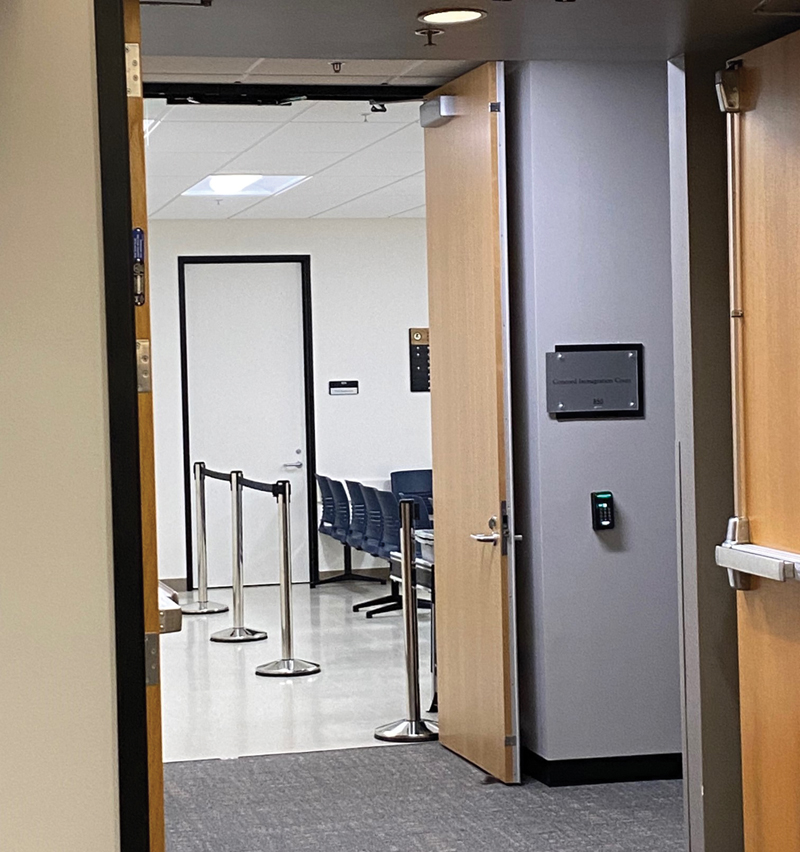Slow ramp-up underway for relief through Concord Immigration Court

CONCORD, CA (May 2, 2024) — Seats sit empty now and hallways are eerily quiet on the 8th floor of Building 2 of the Gateway Office complex. But come early June, that will change.
Judges have been hearing only asylum cases since Feb. 12, when federal authorities opened the Bay Area’s newest Immigration Court at 1855 Gateway Boulevard adjacent to Willow Pass Road. The one assistant chief immigration judge and 10 immigration judges have focused on cases that have advanced through the process and were being heard at the San Francisco site.
The East Bay location is designed to lessen the burden on the San Francisco site, aiming to better serve those seeking relief as the level of new arrivals to the United States increases. As individuals move through the process, court appearances become longer and more involved as court officials gather information to determine the final merit of cases.
In early June, the Immigration Court judges will initiate what is called a master calendar. These proceedings are the first step in what is a long journey for immigrants.
Initial appearances on the master calendar go fairly quickly, taking about five minutes, as the judge asks if the person is a citizen and if they have status here. Subsequently, the judge identifies what the person is applying for and their benefits under the law.
Before the appearance wraps up, persons are advised that they may want to consult an attorney and are given a continuance to retain someone or find a volunteer counsel.
Response to criticism
Some media reports quoted attorneys who were critical of the Concord Immigration Court because it serves 10 counties and the immigrants may not know how to get local legal representation.
Kathyrn Mattingly, a press secretary with the Executive Office for Immigration Review (EOIR), an agency of the Department of Justice, responded by saying the court “is currently staffed to meet all support needs. Computer systems are functioning and EOIR has a dedicated Service Center to assist staff as needed.”
As of late March, the EOIR has initiated several resources for noncitizens navigating court proceedings, including self-help material, Immigration Court help desks where unrepresented respondents can seek assistance and the Immigration Court Online Resource (ICOR), which provides general information on what will happen during court hearings and how noncitizens can prepare for hearings.
“In general, the court has sought ways to improve efficiency through creating specific docket deadlines, implementing various case flow processing measures, and increasing hiring of judges and staff,” said James Horwitz, a spokesman for the National Association of Immigration Judges.
“However, the volume of the caseload still outpaces the number of judge teams seated on the bench today, with a backlog of over 3.4 million cases pending nationally.”
The number of judges assigned to Concord will easily double as master calendar proceedings commence in earnest to accommodate what is a triage process for individuals making their first appearance.
Soon, the court will be filled with the sights and sounds of individuals and families hoping for a better life from whence they came.

David Scholz
David Scholz is back in journalism as a freelance writer and photographer after nearly two decades in education. Prior to moving into teaching in 2000, he worked as a full-time journalist since 1988 for rural community and small daily newspapers in Central Ohio and Northern Nevada, and later in California with The Business Journal in Fresno and dailies in the Bay Area, including The Oakland Tribune and The San Francisco Chronicle. More recently Scholz also worked in an editing, writing, and page layout role with the Rossmoor News.
